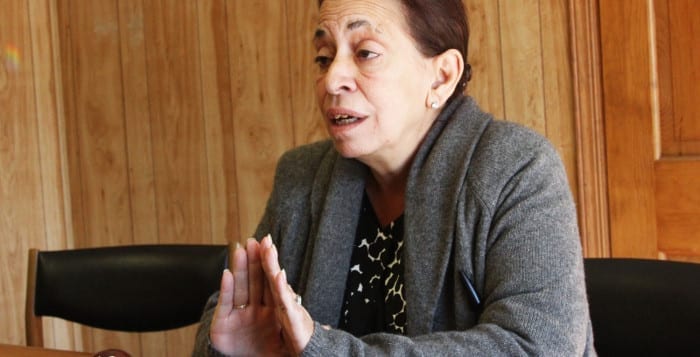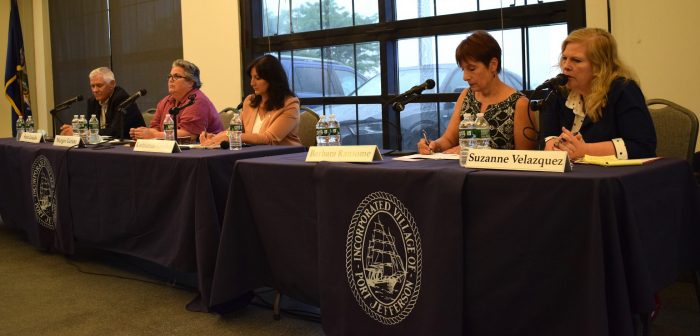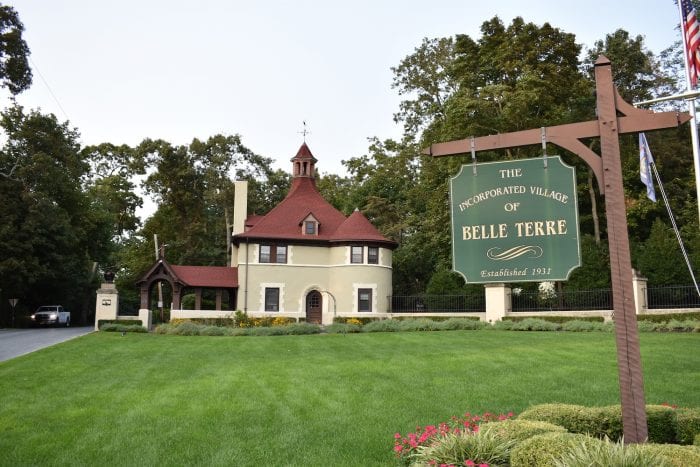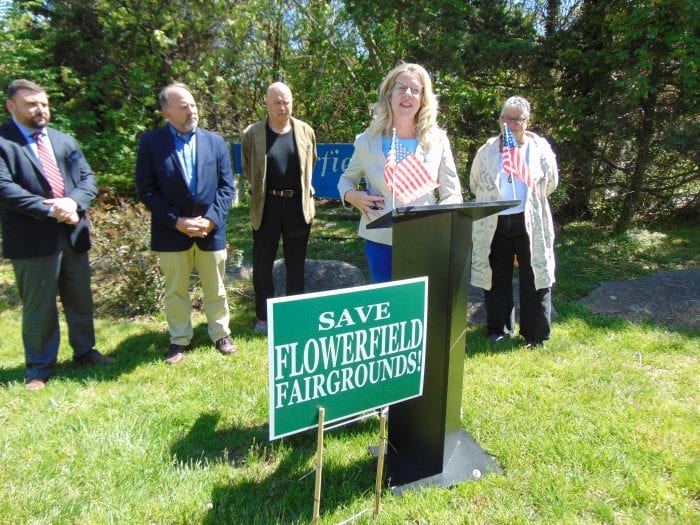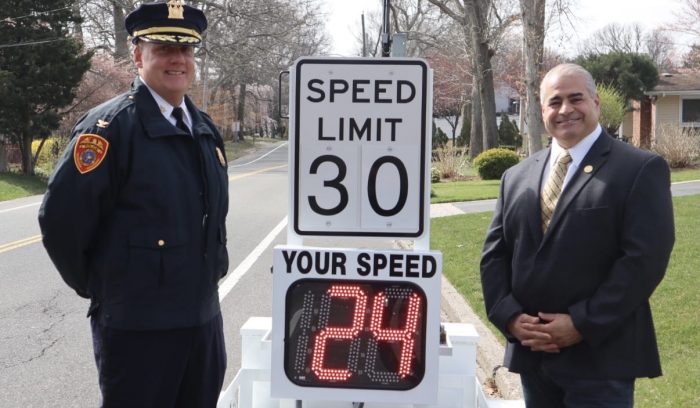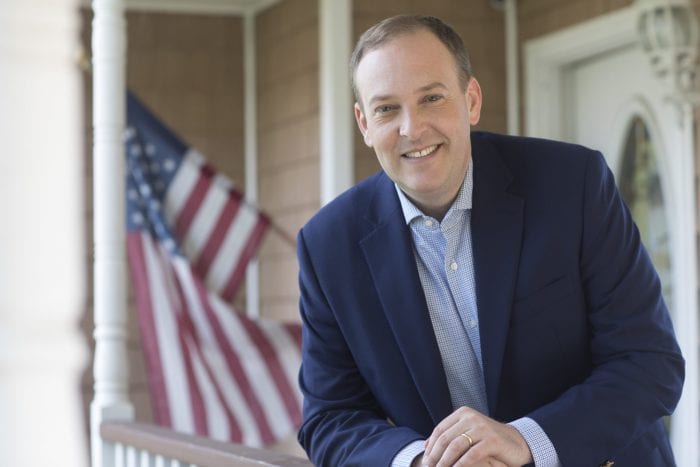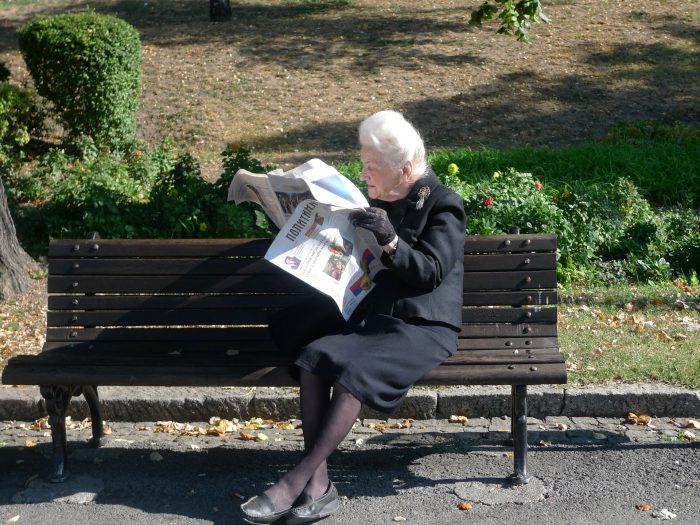For two hours on Tuesday night, dozens of people sat inside the Port Jefferson Village Center to watch the highly anticipated election debate, hosted by the League of Women Voters.
Incumbents trustee Kathianne Snaden, trustee Stan Loucks and Mayor Margot Garant sat alongside Barbara Ransome and Suzanne Velazquez to answer questions from the audience surrounding village issues and how they will work toward them if elected.
Two trustee seats are up, with the two incumbents and Velazquez vying for the spots. Ransome, the director of operations with the Port Jefferson Chamber of Commerce and a past village trustee, is looking to take over Garant’s seat as mayor.
After opening remarks, the first question up was regarding uptown revitalization. Garant said, “Everyone knows uptown is a very challenged business improvement district.” With a master plan in place, she and her team have helped initiate the start of building mixed-use spaces as of three months ago — bulldozing the vacant Bada Bing location to start construction with the Conifer Realty apartments. More plans are being implemented to continue the growth and revitalization of Upper Port, which will continue to take time and planning.
Ransome added that during her tenure with the chamber, membership has increased by 50%. By working with landowners, landlords and closely with Stony Brook University, she said the village is a vital place to conduct business.
“There has always been a line of communication to try to encourage businesses to come down into the village as well in Upper Port,” she said.
The topic of cannabis became heated when all five participants had different views on smoking or ingesting the plant within the village. Garant noted that under Gov. Andrew Cuomo’s (D) legislation, cannabis can be ingested or smoked and for dispensaries to operate, but the village has until the end of the year to opt out. As of right now, Garant has not made a decision because she said it is a “tough decision.”
“Cannabis dispensaries are clean and safe,” she said. “People will want to go to other places and purchase it and come back, but I think it might be an incentive for uptown redevelopment. So, I’ve not closed the door on this. I’d like to hear from my community before I make that kind of decision.”
The village currently has a code which prohibits the use or smoking of tobacco or cannabis products on any village-owned property, which includes village parks but excludes the golf course at the country club.
“We know when we’re on a golf course in the open space, some of the ladies and gentlemen like to enjoy a smoke,” she said. “If we cannot enforce one type of tobacco, it’s difficult to enforce another type of tobacco. So, we’re looking to make it the policy of membership — when you join the country club to prohibit the use of cannabis as a policy when you become a member.”
Ransome said that is called “privilege.”
“It should be an even-lane regulation,” she added.
Loucks believes there should be absolutely no use of cannabis anywhere within the village, while Snaden looked at the issue from both a financial and public safety point of view.
“It could be an opportunity for our town,” she said. “There are tax implications there where we would receive tax revenue but, as the commissioner of public safety, I have a lot of concerns.”
Velazquez, too, was concerned about the close vicinity of the middle and high schools, but also as a health care professional who acknowledges the positives medicinal marijuana could have on a person.
Things got heated again when the discussion of bus shelters and the future of transportation came up. Garant said previously there were issues with graffiti and homeless people using the shelters as a home, along with the loss of the Stony Brook shuttle during COVID. However, she said the shuttle is coming back with the university sporting 50 percent of the bill.
Snaden, who is also the liaison to the village parking and transportation departments, said that the bus will help continue to bring business back.
“I think it’s very important for businesses to have students and staff and anybody else on that shuttle route come into the village to patronize the businesses and the restaurants without their vehicles,” she said.
Velazquez agreed, but was upset by the lack of places for people to sit while they waited for their buses, and that Port Jefferson is the only train station on Long Island that has removed its benches.
“I think that we should make sure that we have places for people to sit,” she said. “Seniors, the disabled or just people wanting to enjoy. I think we should have bus shelters and benches at the train station for everybody to use — not just select who should be allowed to rest.”
Snaden rebutted, noting the reason benches were removed at the train station was because of the multitude of complaints that they received of criminal activity going on around the benches.
“It’s not about selectivity,” she argued. “We do not discriminate as to who can sit and who can rest. We welcome everyone to this village, and we help them in any way that we can. We cannot have crime, we cannot have drug deals, we cannot have what was going on at the train station.”
For public safety concerns, Loucks started off with how proud he was that the Suffolk County Police Department Whiskey Tour would be patrolling the village at night, afterhours.
“They have a little bit more clout than our code officers,” he said. “Our code officers are somewhat restricted with what they can do but are always the first ones there.”
Snaden, who throughout her two years as trustee has implemented several different policies for public safety including the “See Something — Say Something” campaign, as well as a new kiosk for code enforcement to be readily available during their tour.
Ransome argued that when the officers are off duty is when trouble arrives, especially when the bars are let out. She said she would prefer officers to be touring during later hours.
“I think that we need to change our shifts on our codes so that they are working in conjunction with Suffolk County,” she said.
Snaden responded that she is working on making the now part-time officers full time.
“So that would help with those hours, and for them to work closer with Suffolk County later hours into the evening,” she said.
The LIPA power plant and water quality in the harbor were also discussed, with everyone equally acknowledging the importance fiscally of the plant and of renewable green energy. Loud music was asked about, and what the village can do to better control noise after dark, as well as political signs outside of businesses in the village.
When the conversation about the Port Jefferson Country Club came up again, Loucks noted that as of that day, the club had 700 new members.
“I believe the country club is the crown jewel,” he said. “If you’ve not gone up to the country club and walked around the facilities, you really don’t know what you’re missing.”
Ransome agreed, but argued about the senior citizen discount that was taken away, as well as allowing more walkers on the property.
“I think we need to do a better job with our contract we have with our current vendor there, which is The Crest Group, because right now we’re only getting $20,000 a month from the rental of that facility, which is extraordinarily less than what happened when Lombardi’s was there,” she said.
Loucks argued back that when the Lombardi Group left, the space was empty.
“No one wanted to go up there,” he said. “$20,000 per month goes directly to the village — the village residents pay absolutely no tax money to support the club. Zero. It is a self-sustaining country club.”
Other topics included the marrying of Upper Port and downtown, planning committee critiques, the Gap store vacancy and its parking, also the continuous Lawrence Aviation impact and its future.
To watch the whole debate online, visit the Village of Port Jefferson’s YouTube page.
Residents can vote on Tuesday, June 15, at the Village Center at 101A E. Broadway between the hours of 6 a.m. until 9 p.m.

